
At the 1896 Summer Olympics, the first modern Olympiad, twelve athletics events were contested. A total of 25 medals were awarded. The medals were later denoted as 37 modern medals. All of the events except the marathon were held in the Panathinaiko Stadium, which was also the finish for the marathon. Events were held on 6 April, 7 April, 9 April, and 10 April 1896. Altogether, 63 athletes, all men, from nine nations competed. This made athletics the most international of the nine sports at the 1896 Games.

The men's discus throw competition at the 2004 Summer Olympics in Athens was held at the Olympic Stadium on 21–23 August. It was originally planned to hold the discus throw at the Ancient Olympia Stadium, but it was discovered that the field was not large enough to accommodate the range of modern discus throwers, and would have posed a danger to spectators. As such, it was decided to move the discus throw and to hold the shot put at the ancient stadium, despite the fact that the shot put was not contested at the Ancient Olympic Games. Thirty-nine athletes from 26 nations competed.

Panagiotis Paraskevopoulos was a Greek athlete. He competed at the 1896 Summer Olympics in Athens, and the 1900 Summer Olympics held in Paris. He was born in Gortynia and died in Corfu.
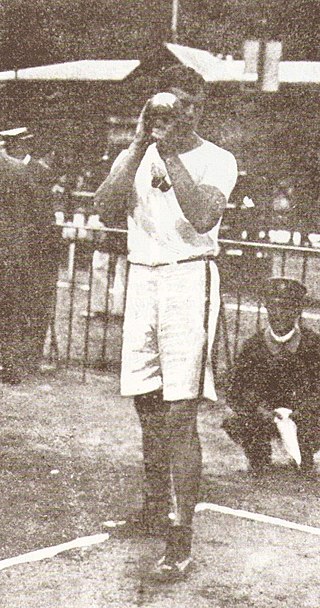
The men's shot put was a track & field athletics event at the 1900 Summer Olympics in Paris. It was held on July 14 and July 15, 1900. 11 shot putters from five nations competed. The event was won by Richard Sheldon of the United States, the nation's second consecutive victory in the men's shot put. Josiah McCracken took silver and Robert Garrett took bronze, completing an American medal sweep.

The men's discus throw was a track & field athletics event at the 1900 Summer Olympics in Paris. It was held on July 14 and July 15, 1900. 17 discus throwers from nine nations competed. The event was won by Rudolf Bauer of Hungary, the nation's first victory in the men's discus throw. František Janda-Suk gave Bohemia its first medal in the event, also in that nation's first appearance. Richard Sheldon's bronze put the United States in the top three for the second consecutive Games.

The men's discus throw was one of six throwing events on the Athletics at the 1908 Summer Olympics programme in London. The competition was held on July 16, 1908. 42 throwers from eleven nations competed. NOCs could enter up to 12 athletes. The event was won by Martin Sheridan of the United States, his second consecutive victory in the event. The Americans completed their first sweep in the discus throw, with Merritt Giffin taking silver and Bill Horr bronze.

The men's shot put was one of six throwing events on the Athletics at the 1908 Summer Olympics programme in London. The competition was held on July 16, 1908. 25 shot putters from eight nations competed. NOCs could enter up to 12 athletes. The event was won by Ralph Rose, successfully defending his title from 1904 and making it four consecutive Games that the event was won by an American. The two-Games streak of sweeps in 1900 and 1904 ended, however, as Denis Horgan of Great Britain took silver. Johnny Garrels of the United States took bronze. Rose was the second man to win two medals in the shot put ; Wesley Coe nearly was the third as he ended up in 4th place, only 11 centimetres behind Garrels.
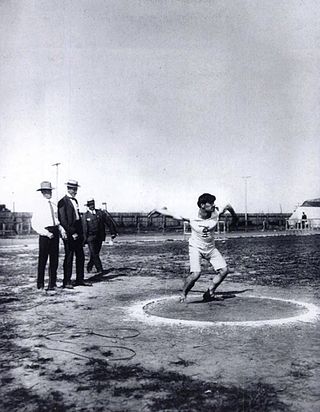
Nikolaos Georgantas was a Greek athlete who competed mainly in the discus throw.
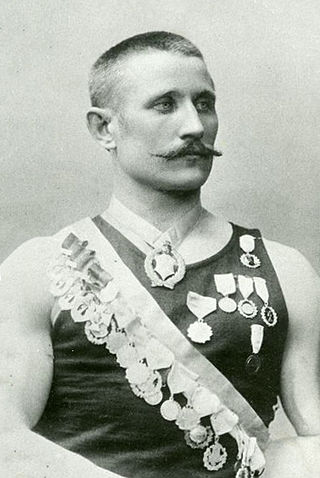
Venne "Verner" Järvinen was a Finnish track and field athlete, who competed mostly in throwing events. He won the gold medal in the Greek-style discus in the 1906 Intercalated Games, and the bronze in the 1908 Summer Olympics, becoming the first Finnish Olympic medalist in athletics. He won the Finnish championship in Greek style discus three times in 1909–1911 and held the national record in discus and hammer throw.

The men's shot put was a track and field athletics event held as part of the Athletics at the 1904 Summer Olympics programme. It was the third time the event was held. The competition was held on August 31, 1904. 8 athletes from 2 nations competed. The event was won by Ralph Rose of the United States, the nation's third consecutive victory in the men's shot put. Americans won silver and bronze as well, completing the second consecutive podium sweep in the event.

The men's hammer throw was a track and field athletics event held as part of the Athletics at the 1904 Summer Olympics programme. It was the second time the event was held. The competition was held on Monday, August 29, 1904. Six athletes, all from the United States, competed. John Flanagan, the reigning champion, defended his gold medal and set a new Olympic record. John DeWitt took silver and Ralph Rose bronze. It was the second consecutive medal sweep for the United States in the event. Flanagan was the first man to earn multiple medals in the event; he would finish with three consecutive victories, a record not matched by anyone in the hammer throw.

The men's shot put was a track and field athletics event held as part of the athletics at the 1912 Summer Olympics programme. The competition was held on Wednesday, July 10, 1912. Twenty-two shot putters from 14 nations competed. NOCs could enter up to 12 athletes. The event was won by Pat McDonald of the United States, the nation's fifth consecutive victory in the men's shot put. The American team swept the top three places, the third time in five Games. Ralph Rose took silver, 9 centimetres shy of a third gold medal; he became the first man to win three medals of any color.

The men's discus throw was a track and field athletics event held as part of the athletics at the 1912 Summer Olympics programme. The competition was held on Friday, July 12, 1912. Forty-one discus throwers from 15 nation competed. NOCs could enter up to 12 athletes. The event was won by Armas Taipale of Finland, the nation's first medal in the men's discus throw. Richard Byrd took silver and James Duncan took bronze to continue the United States' podium streak at five consecutive Games.
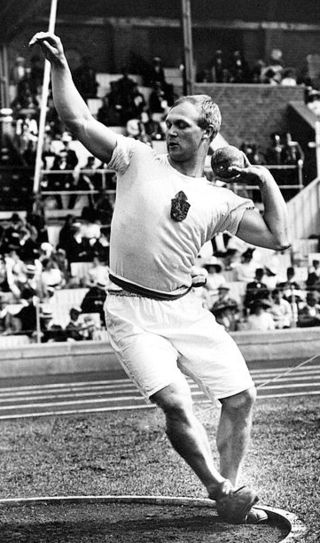
The men's discus throw event was part of the track and field athletics programme at the 1920 Summer Olympics. The competition was held on Saturday, August 21, 1920, and on Sunday, August 22, 1920. 17 discus throwers from eight nations competed. No nation had more than 4 athletes, suggesting the limit had been reduced from the 12 maximum in force in 1908 and 1912. The event was won by Elmer Niklander of Finland, the nation's second consecutive victory in the men's discus throw. Armas Taipale, the winner in 1912, took silver to become the second man to win multiple medals in the event. Gus Pope took bronze, continuing the American streak of podium appearances at all six discus competitions to date.

The men's discus throw event was part of the track and field athletics programme at the 1928 Summer Olympics. The competition was held on Wednesday, August 1, 1928. Thirty-four discus throwers from 19 nations competed. The maximum number of athletes per nation was 4. The event was won by Bud Houser, the second man to successfully defend Olympic gold in the discus throw. It was the fifth American victory in the event. As in 1924, silver went to Finland and bronze to the United States.

The men's discus throw event was part of the track and field athletics programme at the 1948 Summer Olympics. Twenty-eight athletes from 18 nations competed. The maximum number of athletes per nation had been set at 3 since the 1930 Olympic Congress. The competition was held on August 2. The final was won by Adolfo Consolini of Italy. It was the nation's first victory in the men's discus throw; Italy had previously taken bronze in 1936. Giuseppe Tosi earned silver to put Italy in the top two places. Fortune Gordien of the United States won bronze, keeping the Americans on the podium in each appearance of the men's discus throw to date.
The men's discus throw event at the 1952 Summer Olympics took place on 22 July at the Helsinki Olympic Stadium. Thirty-two athletes from 20 nations competed. The maximum number of athletes per nation had been set at 3 since the 1930 Olympic Congress. The event was won by Sim Iness of the United States, the nation's eighth victory in the men's discus throw. Defending champion Adolfo Consolini of Italy took silver, becoming the fourth man to win two medals in the event. American James Dillion won bronze.
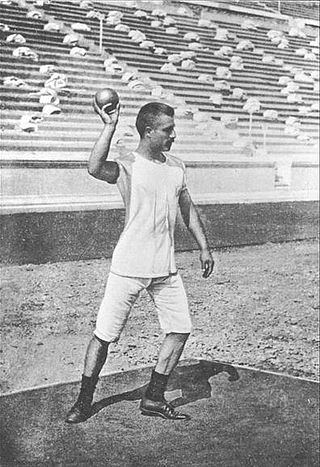
The shot put at the Summer Olympics is one of four track and field throwing events held at the multi-sport event. The men's shot put has been present on the Olympic athletics programme since 1896. The women's event was added to the programme at the 1948 Olympics just over fifty years later.

The discus throw is one of four track and field throwing events held at the Summer Olympics. The men's discus throw has been present on the Olympic athletics programme since 1896. The women's event was first contested at the 1928 Olympics, being one of the five athletics events in the inaugural Olympic women's programme.

The hammer throw at the Summer Olympics is one of four track and field throwing events held at the multi-sport event. The men's hammer throw has been present on the Olympic athletics programme since 1900, becoming the third Olympic throws event after the shot put and discus throw. The women's event was a much later addition, being first contested at the 2000 Olympics.





















